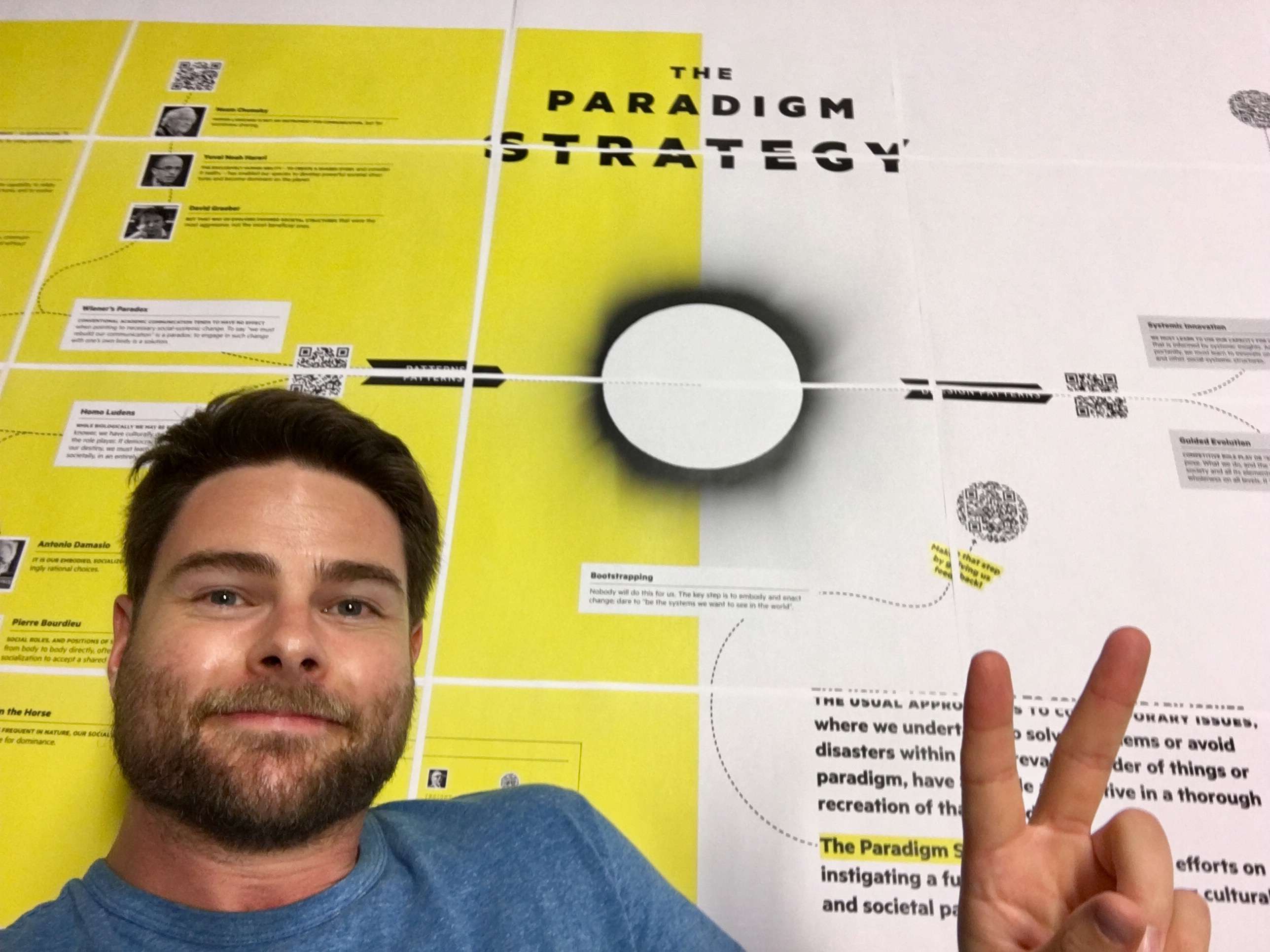Difference between revisions of "CONVERSATIONS"
m |
m |
||
| Line 31: | Line 31: | ||
<p>Don't be deceived by this seemingly innocent word "conversations". Of the four parts of this presentation of a creative paradigm that now wants to emerge among us, and needs to emerge, this is by far the most <em>exciting</em> one. The reasons will become immediately transparent if you recall our purpose. OK, we have developed our [[prototypes|<em>prototypes</em>]] – but hey, who cares? We the people have in recent decades demonstrated a fascinating ability to ignore important insights (recall [[The Incredible History of Doug]], and the [[Wiener's paradox]]). And for obvious reasons – not only the best ideas of our best minds, but also we the people are drowning in an ocean of glut. Everyone seems to be trying to grab our attention with some sensation or other. And isn't that, ironically, the very problem we have undertaken to solve? So how can we do better than just being ignored, better than seeing the ideas of our [[giants|<em>giants</em>]] that we have with so much patience put together once again drown in the ocean of glut?</p> | <p>Don't be deceived by this seemingly innocent word "conversations". Of the four parts of this presentation of a creative paradigm that now wants to emerge among us, and needs to emerge, this is by far the most <em>exciting</em> one. The reasons will become immediately transparent if you recall our purpose. OK, we have developed our [[prototypes|<em>prototypes</em>]] – but hey, who cares? We the people have in recent decades demonstrated a fascinating ability to ignore important insights (recall [[The Incredible History of Doug]], and the [[Wiener's paradox]]). And for obvious reasons – not only the best ideas of our best minds, but also we the people are drowning in an ocean of glut. Everyone seems to be trying to grab our attention with some sensation or other. And isn't that, ironically, the very problem we have undertaken to solve? So how can we do better than just being ignored, better than seeing the ideas of our [[giants|<em>giants</em>]] that we have with so much patience put together once again drown in the ocean of glut?</p> | ||
<p>We have a plan – and that plan is of course part of our [[prototypes|<em>prototype</em>]]. It's a two-step plan. The first step is to make the public an offer that it cannot refuse. A <em>real</em> sensation! In fact we have <em>two</em> sensations, to be precise, because we have two different audiences in mind, and two streams of dialogs. One is for the academic audience; for the well-informed, for the the change-makers. The other sensation is for the public at large.</p> | <p>We have a plan – and that plan is of course part of our [[prototypes|<em>prototype</em>]]. It's a two-step plan. The first step is to make the public an offer that it cannot refuse. A <em>real</em> sensation! In fact we have <em>two</em> sensations, to be precise, because we have two different audiences in mind, and two streams of dialogs. One is for the academic audience; for the well-informed, for the the change-makers. The other sensation is for the public at large.</p> | ||
| − | <p>What we are talking about here is double-edged sensations. On the one side, they challenge people's most cherished beliefs, which are so closed to their socialized sense of identity, that they just won't be able to resist taking up the conversation. On the other side, they will be about the theme that <em>really</em> matters – the course our societal and cultural evolution has taken, and how this course might (need to) be different.</p> | + | <p>What we are talking about here is double-edged sensations. On the one side, they challenge people's most cherished beliefs, which are so closed to their socialized sense of identity, that they just won't be able to resist taking up the conversation. On the other side, they will be about the theme that <em>really</em> matters – the course our societal and cultural evolution has taken, and how this course might (need to) be different.</p> |
| + | <p>The first conversation will be about changing the paradigm as a strategy (for handling our contemporary condition, or more simply for evolving further). It is also about the paradoxes in our academic culture, and in our handling of knowledge at large.</p> | ||
| + | <p>The second conversation is about a much better way of pursuing happiness. But it is also about the essence of religion. (Is there such a thing, you may wonder? If you do, then you'll already know why this may work as a conversation starter. But yes, of course, we do have most concrete and rather surprising things to say.) | ||
</div> | </div> | ||
</div> | </div> | ||
Revision as of 16:50, 19 August 2018
Contents
Federation through Conversations
How to break the silence
Don't be deceived by this seemingly innocent word "conversations". Of the four parts of this presentation of a creative paradigm that now wants to emerge among us, and needs to emerge, this is by far the most exciting one. The reasons will become immediately transparent if you recall our purpose. OK, we have developed our prototypes – but hey, who cares? We the people have in recent decades demonstrated a fascinating ability to ignore important insights (recall The Incredible History of Doug, and the Wiener's paradox). And for obvious reasons – not only the best ideas of our best minds, but also we the people are drowning in an ocean of glut. Everyone seems to be trying to grab our attention with some sensation or other. And isn't that, ironically, the very problem we have undertaken to solve? So how can we do better than just being ignored, better than seeing the ideas of our giants that we have with so much patience put together once again drown in the ocean of glut?
We have a plan – and that plan is of course part of our prototype. It's a two-step plan. The first step is to make the public an offer that it cannot refuse. A real sensation! In fact we have two sensations, to be precise, because we have two different audiences in mind, and two streams of dialogs. One is for the academic audience; for the well-informed, for the the change-makers. The other sensation is for the public at large.
What we are talking about here is double-edged sensations. On the one side, they challenge people's most cherished beliefs, which are so closed to their socialized sense of identity, that they just won't be able to resist taking up the conversation. On the other side, they will be about the theme that really matters – the course our societal and cultural evolution has taken, and how this course might (need to) be different.
The first conversation will be about changing the paradigm as a strategy (for handling our contemporary condition, or more simply for evolving further). It is also about the paradoxes in our academic culture, and in our handling of knowledge at large.
The second conversation is about a much better way of pursuing happiness. But it is also about the essence of religion. (Is there such a thing, you may wonder? If you do, then you'll already know why this may work as a conversation starter. But yes, of course, we do have most concrete and rather surprising things to say.) </div> </div>
Dialogs
A new way to communicate
<p>When we present the mentioned disruptive ideas to the public, or to our two audiences, our goal will not be to convince them that the things "really are" as claimed. You'll remember now that this would indeed be contrary to our purpose! Our real purpose is to begin two conversations. And through those conversations, by orchestrating them and evolving them suitably, to develop a new way to communicate – to evolve a collective mind that is capable of thinking new thoughts, creating new shared visions – notably the vision of what's really going on in our time, and what it is that we need to do together.</p>
<p>The dialog is to the emerging paradigm as the debate is to the old one. The dialog too might have an icon giant, physicist David Bohm.</p>The Paradigm Strategy dialog
See
On dialogue
<p>TBA</p>


